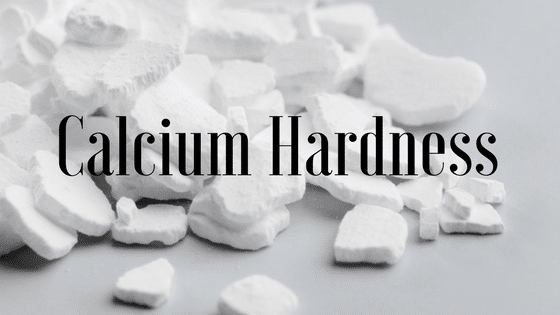What is calcium hardness?
Calcium hardness is an important water chemistry factor we test for, and it is integral to the LSI balance of water.
Calcium Hardness (CH) is the sum of all dissolved calcium ions in water, in various forms. Calcium hardness is expressed as ppm (or mg/L) of calcium carbonate (CaCO3). It is a subset of Total Hardness, which includes other mineral ions like Magnesium.
Calcium hardness is not only calcium carbonate. It includes other dissolved calcium compounds that include the calcium cation.
We test calcium hardness as an essential component of water chemistry. Because it doesn't change rapidly, we recommend testing calcium hardness monthly, with the exception of a startup where you should be testing it the first three days in a row.

Calcium in its various forms
Elemental calcium (Ca) has two valence electrons that break away, which leave the more stable calcium ion (Ca++). Because its valence is positive, calcium is a cation. But let's just call it the calcium ion.
The calcium ion seeks anions with negative valences, and the most predominant among these is carbonate ion (CO3--). [As an aside, in this section of our website, we are unable to format with subscript and superscript, so we apologize for the confusion on these formulas.]
Calcium pairs up with anions to create various compounds like:
- calcium carbonate
- calcium bicarbonate
- calcium phosphate
- calcium sulfate
- calcium silicate
Calcium and the Langelier Saturation Index (LSI)
Calcium hardness is a key factor that must be measured to know the true balance of water. We at Orenda believe the objective metric for water balance is the Langelier Saturation Index (LSI). The LSI tells us the saturation equilibrium of calcium carbonate. An oversaturation leads to scale, and an undersaturation leads to etching and corrosion.
Our first pillar of proactive pool care is LSI Balance. Calcium is the bedrock of our chemistry strategy because it allows your water more stability in varying temperatures. A solid base of calcium carbonate in the water allows you more options when adjusting other factors in water chemistry, such as having lower total alkalinity (TA), which can unlock the ability to better contain pH from naturally rising too high.

Summary
Calcium hardness is a measure of how much calcium is dissolved in the water. It includes dissolved calcium ions and compounds like calcium carbonate and calcium bicarbonate. It should be tested on each and every pool. We recommend monthly testing because calcium hardness does not change rapidly.